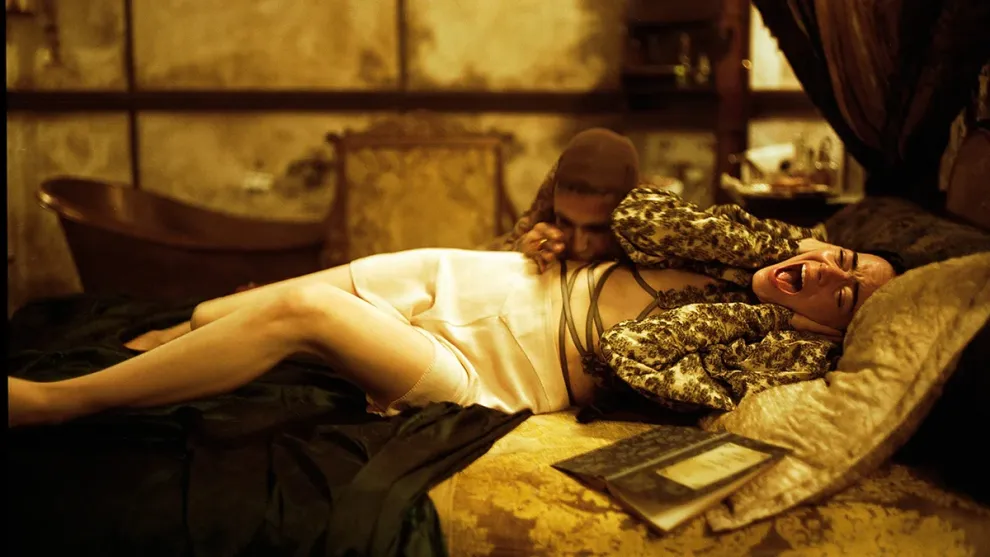
In Poor Things, there’s a scene where the protagonist, Bella Baxter (Emma Stone), makes her way onto a dance floor, moving erratically with uncontrollable fervor. Her movements resemble that of a marionette without a puppeteer. With every step, it’s as though she is snapping away each invisible string. There’s a sense of freedom in every dance move.
Based on the 1992 novel of the same name by Alasdair Gray, the latest film directed by Yorgos Lanthimos and written by Tony McNamara, takes many cues from Mary Shelley’s Frankenstein. Reanimated from the dead by her own Dr. Frankenstein, whom she refers to as “God,” Bella is an experiment. She was brought back to life to a very controlled existence, but one in search of meaning. Throughout the film, she will become her own creation in a unique and twisted fairytale about identity, self-discovery, and above all, freedom.
Bella’s body and mind are out of sync. On the outside, she’s a grown woman, but the brain inside her head is that of a child. It’s her maker, Dr. Godwin Baxter’s (Willem Dafoe) work. Bella is her maker’s masterpiece, but the monster in this tale is really the maker. Referred to as one whenever he walks down the street, he has a jigsaw puzzle for a face, like a work of Picasso. Something of an experiment himself, Godwin’s skin has been removed and replaced like a skin graft. Dafoe plays him in a way that makes him feel like both a sympathetic father figure and a controlling puppet master.
Lanthimos invites his audience into a Victorian steampunk setting that’s just as off-kilter as its narrative. The off-key strings of Jerskin Fendrix’s score mirror the eccentricity of the first half’s gothic mansion setting. Fish eye lenses act as a peephole into the character’s mysterious lives, while also acting like a microscopic examination of Bella’s development. She bangs on piano keys with childlike curiosity and throws plates on the floor with mischievousness. She forms her words like a newborn and walks mechanically, not yet confident in her stride. Everything is kooky but with black-and-white visuals. Bella, at this point, is a blank slate, just beginning to form her adventurous spirit. Rebelling against Godwin, “God,” who has kept her sheltered all her life is sparked and intensifies with the arrival of other parties. There’s the kind-hearted Max (Ramy Youssef) who becomes the doctor’s assistant, and later, Bella’s betrothed. But marriage will only be another imprisonment. Then, there’s Duncan Wedderburn (Mark Ruffalo in his best and funniest role yet). He’s a lawyer, a bit of a creep but a smooth talker, and the first to offer her freedom.
What ensues is a whirlwind adventure across continents with the most awe-inspiring production design by Shona Heath and James Price. Poor Things presents a world completely reimagined and wondrous in construction. Its otherworldly artistry is presented as though seen through the eyes of a child, like Bella projecting her fresh, mystical view of the world onto the screen.
“Bella want to look at world,” she says – and she does. Color fills the screen in an erotic awakening as her journey of enlightenment begins. She develops a hunger for everything: experiences, sex, food, and drink. She has a grand appetite, indulging herself in everything the world has to offer. But she learns, beginning in Lisbon, that the world’s pleasures can be both thrilling and crushing. She is moved by the voice of a woman singing; taken aback by a couple’s arguments; shocked by the fury of a man’s violence. Experiencing both beauty and cruelty awakens her to her desires, morals, and values.
Poor Things is one of the most unique feminist works. Set in a period where women’s liberation went against polite society, Bella becomes her own woman as she fights against any means of control. Emma Stone delivers the best, most transformative performance of her career. It’s an all-timer. The film is full of humor and that comes out in Bella’s response to men trying and failing to keep her down. She’s foul-mouthed – McNamara’s screenplay is written with ingenious wordplay. Bella’s behavior as she learns her stride and develops is quite revolutionary for her circumstances and also for today where stuff like sex is still taboo. Most poignantly, she discovers her flaws, and despite often being denounced, accepts them.
Poor Things is an empowering cinematic treat for flawed women who yearn to be free of shame.



